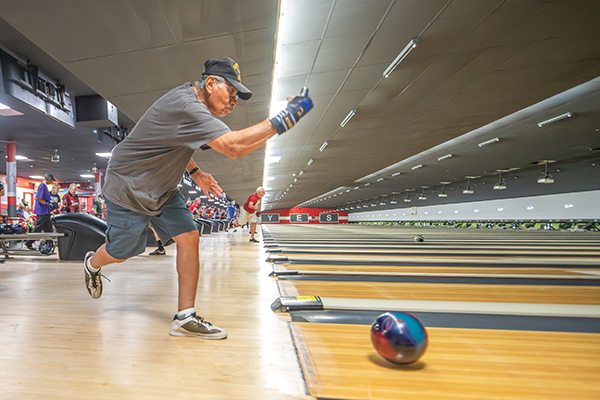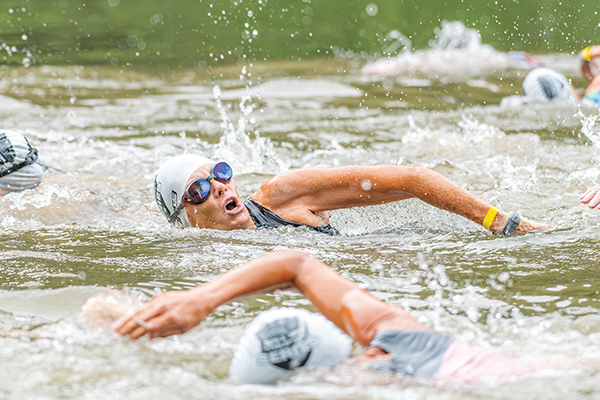
With an economic impact of $32 million, the most recent presentation of the National Senior Games made a lasting (and positive) impression on the city of Pittsburgh. The event welcomed more than 10,000 athletes, along with their families and supporters, generating a total of 14,155 room nights.
This success aligns with a growing recognition of the importance of physical activity, social engagement and overall wellness in aging populations. The National Senior Games exemplify these values by providing an inclusive, inspiring and competitive platform for older adults.
Held biennially in cities across the United States, the Games bring together over 11,000 participants, ages 50 to 100+, to compete in more than 25 sports. This world-class event celebrates the achievements of senior athletes and promotes active lifestyles across generations. Athletes qualify through State Games competitions, which offer a competitive, community-focused experience and foster meaningful social connections.

Participants are drawn to the Games for a variety of reasons. Some pursue medals and personal bests, while others come for the camaraderie, the shared experiences and the joy of the event itself, which includes watching competitions, engaging in ceremonies like the torch relay and Celebration of Athletes and spending quality time with friends and family. Many also take the opportunity to explore the host city’s cultural, culinary and entertainment offerings.
The 2025 National Senior Games will be held in Des Moines, Iowa, from July 24 to August 4. The following cities are on our schedule. We are planning and looking forward to hosting our Games in the following cities:
• 2027: Tulsa, Oklahoma
• 2029: Birmingham, Alabama
Tulsa, the site of this year’s Sports ETA Symposium, offers a wonderful array of sports venues and a wide range of attractions, including museums and historic Route 66.
Birmingham, a returning host, previously welcomed our Games in 2017 with great success, generating a $30 million economic impact. We continue to be impressed for their passion to bring the Games back to the “Magic City.” We’re often asked where we will be going next. Midsize cities consistently prove to be the ideal hosts for our Games. They allow our event to take center stage and to ensure that our athletes feel recognized and appreciated.
Site selection considers several key factors: the quality and accessibility of sports facilities, lodging availability and the city’s dining, sightseeing and entertainment options.
A valued recent addition to our operations is our partnership with Team Travel Source. After a successful collaboration in the previous Games, they will once again support athlete lodging coordination in Des Moines, streamlining the process for participants.
Changes to the Sports Lineup

We continually evaluate our sport offerings to remain aware of the sport trends within our demographic. Two of our sports, racquetball and racewalking, will be featured for the final time at the 2025 Games. Declining participation and limited venue options have made it increasingly challenging to support these sports at the national level. While these changes are difficult, participants may still compete at state-level events or through other organizations.
Several new sports have been added in response to the growing interest. These include disc golf, beach volleyball, billiards, powerlifting and tai chi. New events also have been added to a few of our current sports, such as a one-mile intergenerational road race, a basketball skills challenge (including free-throw and three-point shooting), a golf scramble and a non-ambulatory pickleball event.
The addition of new sports follows careful consideration of factors such as fiscal sustainability, facility availability across the country and the ability for state organizations to host qualifiers. Importantly, new sports must be accessible to both men and women.
Demographic Trends and Participation
Efforts continue to increase participation among the 50 to 60 age group, which historically has been underrepresented compared to our older age brackets. Encouragingly, the gender balance among athletes has become nearly equal — approximately 51 percent male and 49 percent female. Sports such as pickleball and basketball have played a pivotal role in this shift.
What’s even more interesting is many of our older female athletes did not have access to organized sports during their youth, due to the lack of opportunities before the implementation of Title IX. Their current involvement is a powerful testament to perseverance, passion and the lifelong value of sport.
Loss of a Pivotal Senior Athlete
In October 2024, the National Senior Games Association mourned the loss of longtime athlete Julia Hawkins at the age of 108. Julia, affectionately known as “Hurricane Hawkins,” began her Games journey as a cyclist in 1995, earning six gold medals before transitioning to track & field at the age of 100. While we will miss her presence, we know that Julia’s life and accomplishments continue to inspire athletes of all ages and exemplify the spirit of the Games.
The National Senior Games strive to create meaningful opportunities for older adults to engage in sport, foster wellness and build community. Whether participants are competing for medals or embracing new challenges, the Games remain committed to promoting healthy aging and celebrating the lifelong joy of physical activity, no matter where the event is held. SDM

